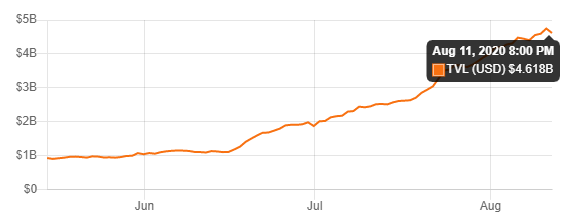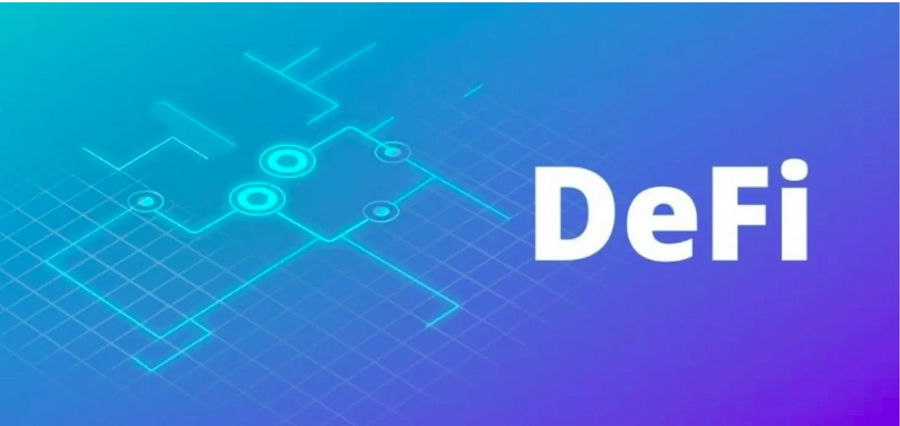Right now, the entire world of Blockchain has its attention on Decentralized Finance. Not since the boom days of the ICO craze in 2017 has a trend captured the discourse of the community. This is with good cause too. Unlike the Initial Coin Offerings of the past, DeFi products already have a use case in operation, not a promise of something that will be developed at some point. The crypto space has grown exponentially since the start of 2019 and has not slowed down even as the world’s economy is under recession due to the pandemic crisis.

As we can see from the chart provided by DeFi Pulse, almost 4.62 billion US dollars are locked in Decentralized Finance. Most of this growth has been during the last three months and has increased in speed since July, even after the world’s markets enter into a recession. Many believe it to be the start of an irreversible trend that will continue to push blockchain into mainstream adoption.
Read DeFi Apps: What you Need to Know (2020) for a complete breakdown of the DeFi space.
It seems that after the pandemic is over and the world begins to rebuild, an opening will be created for blockchain. Many of the old systems broke down during this crisis and will have to be reshaped in a different way, making them more resilient and cheap to run supply chains, information markets, medical systems, and finance.
Decentralized Finance promises to reestablish blockchain importance in a post-pandemic world. The idea of bringing traditional financial services to the blockchain, and with it opening them up to the general public is a powerful one. Exchanges like Remitano, trading, savings, liquidity pools, investments, etc. are accessible to anyone with a little amount of knowledge of blockchain. This will only grow in the future and generate even more innovation in the global economy.
(READ MORE: Bitcoin thieves move 3,897 BTC worth $42 million in 1 hour)
The financial power of decentralized finance is particularly important for Nigeria. As a developing nation, the application of new technologies could allow the country to leapfrog ahead of more advanced nations that rely on older technologies in the financial market. This makes DeFi one of the great promises of the people living in countries outside the developed world.
The opportunities brought by DeFi have made projects such as Compound, Aave, Uniswap, Synthetix, and other common knowledge for the crypto world. These are, in some aspects, the most successful and widely recognized projects in the space. Many people know about them, and many use them regularly. But the DeFi revolution is just starting, and there are many more projects that have just begun or are on a low profile, which have the potential of becoming the next big thing. On this list, we will review some of them.
Ocean (OCEAN)

Ocean is a protocol that aims to open the data economy. We know that our data is sold and bought without our control by unknown parties. Ocean aims to open a secure marketplace where data can be transacted on a Blockchain transparently. This is especially important with the advent of neural networks. Neural networks are programs that will buy and sell data in fractions of second thousands of times per minute. The union of Blockchain and data sharing will create a new data economy, in which everyone will benefit and have control over their information.
The data economy is the future of the global economy. As Nigeria looks to pull ahead of other developing nations, it must enter this market. Ocean is the perfect platform for entrepreneurial Nigerians, aiming to be at the center of the future economy.
(READ MORE: BAND, fastest growing crypto gains 5,620% in 7 months)
Plutus DeFi (PLT)

Plutus is an incredible DeFi aggregator project. In one single platform, different DeFi projects such as lending, borrowing, insurance, privacy apps, and even exchanges will be integrated into a single protocol. From Plutus, a user will be able to navigate all the DeFi space in search of better prices and higher margins for their crypto.
Plutus claims to project agnostic. Since they are not some DeFi protocol, they can pull together the entire space in one platform without any biases against any other project out there. They have integrated most of the Ethereum web wallets to work with their network. They already offer lending in their platform, directly connecting with Compound, dy/dx, and other major liquidity pools in the Ethereum blockchain.
Any Nigerian trader looking for an edge in DeFi has to consider Plutus. The power to have all of the latest Dapps integrated into a single platform gives the user a unique advantage over the competition and a foothold in the future economy.
Akropolis (AKRO)

Akropolis is a framework where people can develop for-Profit Decentralized Autonomous Organization. These are entities without a central authority that aim to generate financial gains for the participants. The team at the project calls the Autonomous Financial Organizations, which serve a specific community’s needs.
Their first product name Sparta (laying thick the Greek references), is where people can issue uncollateralized loans. These are loans where the borrower doesn’t have to provide 100% or more collateral to receive funds. This is massive in Blockchain, where almost every asset needs more than 100% collateralization. In Sparta, a borrower provides 50% collateral. The project has a new update in the works named Delphi, which will introduce staking and yield farming—further advancing the utility of the protocol.
(READ MORE: 9,007 crypto ATMs available globally for crypto transfers)
As Nigeria has one of the fastest-growing credit markets in small loans, Akropolis rises as the perfect solution. The ability to create an on-demand Autonomous Financial Organization to give out community credit and other financial services is key to grow an economy. This is perhaps the most important project on the list for Nigerians and a true gateway into a more fair and dynamic economy.
Kava (KAVA)

A cross-chain lending platform, Kava aims to bring together tokens and coins in a single space. Most lending protocols out there work in a specific Blockchain, take Compound as an example; it only works with Ethereum based tokens. Kava is a cross-chain lending platform that can take different assets native to any Blockchain under one single marketplace. It now supports assets from different protocols such as BTC, XRP, BNB, ATOM, with many more to come.
Unlike most cryptocurrency out there, the Kava token has never crashed. Its price is at the all-time high for the network, and it keeps moving up. This is unusual for Blockchain projects, which have never recovered from the previous highs of the 2017 to 2018 era. Kava is now witnessing its rise, and as the DeFi space grows, the future of the project seems very promising.
Most of these projects work with the Ethereum Blockchain. So, any Nigerian looking to begin their crypto journey needs to buy some Ether or BTC.
Check out the guide on how to buy BTC or ETH using Naira in a safe and fast way.
As we can see, DeFi does not lack innovation. The projects highlighted here are but a handful of a large pool of disruptive services being developed as we speak. The time is now to jump into the DeFi wagon and join a journey that will completely transform the finance sector, break down financial barriers, and finally transform the global economy, making it more open, transparent, and inclusive for all the inhabitants of the planet.
















